CHRISTIAN HOLIDAYS AND FESTIVALS
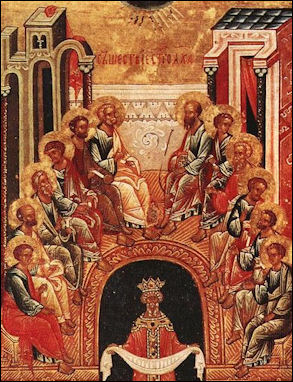
Pentacost, the Day of the
Descent of the Holy SpiritThe main holy days for Christianity are Christmas (celebrated on December 25 in the Western tradition) and Easter (celebrated in the Western tradition on the first Sunday after the first full moon in spring). Christmas celebrates the birth of Jesus, although it is not known for sure when exactly he was born. Easter celebrates the Resurrection of Jesus.
Annual Christian Festivals:
Lent
The Easter period, in Spring (dates vary):
Holy Week
Easter
Ascension Day (40 days after Easter)
Pentecost (7th Sunday after Easter)
The Christmas period, late November to early January
Annunciation, 25 March
Advent, the period leading up to Christmas: begins on the Sunday closest to 30 November
Christmas Eve, 24 December
Christmas Day, 25 December
Epiphany, early January
Although these holy days are commonly celebrated worldwide on the dates recognized by the Western tradition, in some areas, including parts of Eastern Europe and in the Middle East, they are often celebrated later. This is mainly because The Orthodox Church observes the Julian calendar instead of the Gregorian calendar (the calendar used in most of the world today). Holidays such as Christmas and Easter are 13 days later on the Julian-Orthodox calendar than holidays on the Gregorian calendar. The Julian calendar is older. It was established by the Roman Empire and has a 12-month year with 365 days. The more modern Gregorian calendar is a 1582 revision of the Julian calendar with leap years and days that keep the calendar in sync with the seasons.
See Separate Articles EASTER AND EASTER-RELATED HOLIDAYS factsanddetails.com , HOLY WEEK SEASON factsanddetails.com
Websites and Resources on Christianity BBC on Christianity bbc.co.uk/religion/religions/christianity ;Christian Answers christiananswers.net ; Christian Classics Ethereal Library www.ccel.org ; Sacred Texts website sacred-texts.com ; Internet Sourcebook sourcebooks.fordham.edu ; Christian Denominations: Holy See w2.vatican.va ; Catholic Online catholic.org ; Catholic Encyclopedia newadvent.org ; World Council of Churches, main world body for mainline Protestant churches oikoumene.org BBC on Baptists bbc.co.uk/religion/religions/christianity ; BBC on Methodists bbc.co.uk/religion/religions/christianity ; ; Orthodox Church in America oca.org/saints/lives ; Online Orthodox Catechism published by the Russian Orthodox Church orthodoxeurope.org
RECOMMENDED BOOKS:
“A Christian Guide to the Biblical Feasts” by David Wilber Amazon.com ;
“The Pagan Origins of Christian Holidays” by Elisha J. Israel Amazon.com ;
“Feasts of the Bible” by Rose Publishing Amazon.com ;
“Lent: The Season of Repentance and Renewal” by Esau McCaulley Amazon.com ;
“Journey to the Cross: A 40-Day Lenten Devotional” by Paul David Tripp, Bevan Greiner, et al. Amazon.com ;
“Easter: Its Story and Meaning” by Alan Watts Amazon.com ;
“The Case for Easter: A Journalist Investigates Evidence for the Resurrection” by Lee Strobel Amazon.com ;
“Jesus of Nazareth: Holy Week: From the Entrance into Jerusalem to the Resurrection”
by Pope Benedict XVI, Matthew Arnold, et al. Amazon.com ;
“The Last Week: What the Gospels Really Teach About Jesus's Final Days in Jerusalem”
by Marcus J. Borg, John Dominic Crossan, et al. Amazon.com ;
“The Resurrection of Jesus: Apologetics, Polemics, History” by Dale C. Allison Jr, Jim Denison, et al. Amazon.com ;
“The Mystery of the Last Supper: Reconstructing the Final Days of Jesus” by Colin J. Humphreys Amazon.com ;
“Jesus and the Last Supper” by Brant Pitre Amazon.com ;
“The History of Christmas: 2,000 Years of Faith, Fable, and Festivity” by Heather Lefebvre Amazon.com ;
“Stories Behind the Great Traditions of Christmas” by Ace Collins Amazon.com ;
“The Birth of the Messiah” by Father Raymond E. Brown Amazon.com ;
“The True Meaning of Christmas: The Birth of Jesus and the Origins of the Season”
by Michael Barber Amazon.com
Why the Christian Sabbath Is on Sunday
Why is the Christian Sabbath on Sunday and the Jewish Sabbath on Saturday? Swiss scholar Willy Rordorf has argued that it is because early Christians regarded the Sabbath as every day of their life while Jews regarded it as symbolic of the seventh day of Creation, on which God rested. Christians replaced the Jewish Saturday Sabbath (seventh day of the week) with Sunday (the first day of the week) to symbolize their belief in the everyday Sabbath. “The idea of rest played absolutely no part in the Christian Sunday," Rordorf said. Sunday was also the day of rest that Constantine ordained as such in A.D. 321. But Christians did not necessarily abandon the Jewish Sabbath which is why. Some argue, we have a weekend. ["World Religions" edited by Geoffrey Parrinder, Facts on File Publications, New York]
Michael J. McClymond wrote in the “Worldmark Encyclopedia of Religious Practices”; The earliest Jewish believers in Jesus worshiped in synagogues on Saturdays and gathered again on Sundays for Christian worship. By the second century the number of Jews in the church had declined, and worship on Sunday, understood as the day of Jesus' resurrection, displaced Saturday worship with-in the mainstream of Christianity. An exception was Ethiopian Orthodoxy, which kept a number of Jewish practices, including Saturday Sabbath observance. [Source: Michael J. McClymond, “Worldmark Encyclopedia of Religious Practices”, 2000s, Encyclopedia.com]
Saint Days
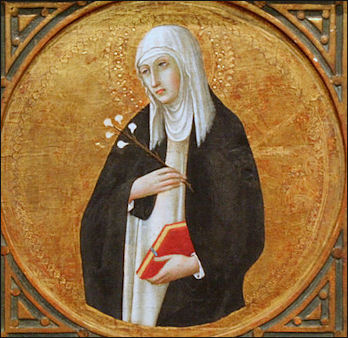
St. CatherineCelebrations honoring local patron saints are the main annual events in many towns and regions. Some Christians celebrate their patron saint day rather than their birthday. For example, if someone is named George they have a big party on St. George's feast day. In some places first communions are big social events in which parents by buy their children fancy clothes and have a nice dinner.
Major Saint Days: April 25, St. Mark; April 30, St. Catherine; May 16, Joan of Arc; June 5, St. Boniface; June 13, St. Anthony; June 24, St. John the Baptist; June 29, Sts. Peter and Paul; July 25, St. James the Great; July 25, St. Christopher; September 21, St. Matthew; October 4, St. Francis of Assisi; October 18, St. Luke; November 22, St. Cecilia; and November 30, St. Andrew.
Some denominations of Christianity also celebrate Saints' days, which happen on fixed dates every year. According to the “Worldmark Encyclopedia of Religious Practices”: The calendar of saint's days has never been uniform throughout Christendom. Lutherans and Anglicans have tended to commemorate only those saints who were biblical characters, and many Protestants have ceased from honoring saint's days altogether. At the time of the Reformation, Protestants emphasized Sunday worship as the chief feature of the Christian calendar. Some Protestants do not celebrate any events in the liturgical year, including Christmas and Easter. Yet secular holidays, like Mother's Day and the Fourth of July in the United States, have sometimes found their way into church celebrations as quasi-sacred events. [Source: Michael J. McClymond,“Worldmark Encyclopedia of Religious Practices”, 2000s, Encyclopedia.com] >
B.C., A.D. and Who Said the World began in 4004 B.C.?
The modern system of dating was devised by Dionysius Exiguus (Little Dennis), a 6th century Christian monk who was trying to figure out a way to reliably predict Easter. He lived in Rome and devised the system for counting years after Christ was born based on erroneous calculations. Worldwide use of the Christian calendar didn't catch until the 1800s when it was spread around the globe by imperialism and trade.
"B.C." stand for "Before Christ" and "A.D." stands for Anno Domini ("Year of Our Lord"). Some scholars have replaced "B.C." with "B.C.E." ("Before Common Era") and A.D. with "C.E." ("Common Era") to get rid of religious prejudice. Early calendars had no year 0 because the Romans hadn't devised zero. The year of Christ' birth was designated as 1 A.D. See When Christ was Born
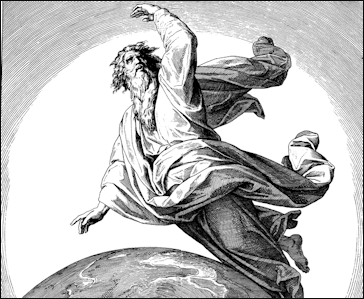
God Creating the Earth Irish prelate and scholar Archbishop James Ussher (1581-1659) was the person who fixed the date of creation in the year 4004 B.C. by examining the scriptures. During the Middle Ages most people weren't concerned with investigating ancient history because they believed the Bible recorded the events between Eden and Jerusalem adequately and the Greeks and Romans recorded the development of the Mediterranean. The world outside the Holy Land and Europe did not exist and most people did not think about what happened before Biblical Times.
An Irish prelate by the name of James Ussher (1581-1656) is the source of the generally accepted view among creationists that God created the world at 9:00am on October 26, 4004 B.C. Ussher was expert in Semitic languages, who had studied ancient texts from the Middle East and Europe nearly his entire lifetime before he announced the date in 1654. The assertion gave credibility to Christian belief that the world was created in a single week and no species existed before or were added afterwards.
The Jewish rabbi Natan Slifkin, based on his literal reading of Genesis, claims the world began in 3759 B.C. After declaring this he was condemned by leading rabbis and Jewish scholars. One of Rabbi Slifkin’s supporters told the New York Times, “the same scientists who tell you with such clarity what happened 65 million years ago — ask what the weather will be like in New York in two weeks time.”
Christian Year and Immovable and Movable Feasts
The Christian liturgical year consists of both movable and fixed celebrations. The former include those whose calendar dates vary each year with the date of Easter , while the latter always fall on the same date. Essentially there are two annual cycles, one connected with Easter, Christmas, and the life of Jesus, which is known as temporale, or the Proper of Seasons. A second cycle includes the festivals of the saints, which is known as sanctorale, or the Proper of Saints. [Source: Michael J. McClymond, “Worldmark Encyclopedia of Religious Practices”, 2000s, Encyclopedia.com]
Immovable feasts are Christian holidays that keep the same date every year. They include: New Year’s Day (January 1); Epiphany (January 6); Candlemass (February 2); Annunciation (March 25); Transfiguration (August 6); Assumption (August 15); All Saint’s Day (November 1); All Soul’s Day (November 2); Immaculate Conception (December 2); Christmas (December 25th);
Movable feasts are Christian holidays that change every year. They are a manifestation of the church to keep moon-fixed festivals in line with the solar calendar. In some ways the system exists to that holidays will happen on a Sunday. The main festival that moves is Easter, and since many other festivals have their dates fixed in relation to Easter, they move with it. [Source: June 16, 2009 BBC |::|]
Lent is a period of 40 days, not including Sundays, ending with Easter. Carnival embraces the days before Lent Shrove Tuesday is the day before Lent. Ash Wednesday is First Day of Lent. Holy Week is the last week of Lent and the week before Easter. It embraces Palm Sunday (Sunday before Easter), Maundy Thursday (Thursday before Easter); Good Friday ( Friday before Easter) and Easter (First Sunday after the first full moon after the vernal (spring) equinox).
The main movable feasts and after Easter are: Ascension Day (40 days after Easter); Whitsunday, or Pentecost Day (50 days after Easter); Whitmonday (the day after Whitsunday);Trinity Sunday (Sunday after Whitsunday); and Corpus Christi Day (two Thursdays after Whitsunday).

Christian feasts in June
Evolution of Christian Holidays
Michael J. McClymond wrote in the “Worldmark Encyclopedia of Religious Practices”: In 325 A.D., at the Council of Nicea, the date of Easter was fixed as the Sunday following the first full moon after the vernal equinox. Despite this decision, the difference between the Gregorian and Julian calendars resulted in a celebration of Easter on different days among Western and Eastern Christians. As the tradition developed, the period from Palm Sunday, commemorating Jesus' triumphal entry into Jerusalem, to Easter Sunday was set aside as Holy Week. Thursday through Saturday of Holy Week became known as triduum, and the Saturday Easter Vigil was an extended service for biblical lessons and the lighting of candles. [Source: Michael J. McClymond, “Worldmark Encyclopedia of Religious Practices”, 2000s, Encyclopedia.com]
In early Christianity the Easter Vigil became the most appropriate time for baptizing new members, with a part of their preparation being a period of fasting that was gradually extended to 40 days, in imitation of Jesus' fast in the wilderness. Over time the fast was extended to include all Christians, with the church defining Lent as a period for self-denial and contrition for sins. By the second century the Christian Easter celebration initiated a 50-day period of rejoicing, the season of Pentecost. By the fourth century a celebration of Jesus' ascension into heaven occurred on the 40th day following Easter, and the sending of the Holy Spirit 10 days later, on the day of Pentecost, or Whitsunday.
In addition to Easter, the major annual festivals are Christmas (commemorating Jesus' birth) and Epiphany. In the early fourth century Roman Christians celebrated December 25 as the festival of Jesus' birth and the beginning of the year. This date coincided with the pagan solstice festival of Sol Invictus, yet December 25 may have been selected by adding nine months to March 25, already celebrated as the date of Jesus' conception. Orthodoxy also celebrates Jesus' nativity on December 25. In Eastern Christianity, perhaps as early as the second century, a festival of Epiphany was set on January 6 to commemorate Jesus' baptism and his revelation as a member of the Holy Trinity. In most Latin cultures Epiphany is a time for exchanging gifts, after the example of the Magi. In northern Europe and in English-speaking countries, the exchange of gifts takes place on December 25. Just as Lent prepares for Easter, Advent, usually lasting four weeks, is a season of preparation for Christmas.
Beginning with the Protestant Reformation, and especially in Britain, there was discussion regarding the Old Testament commandment to "remember the Sabbath day, and keep it holy" (Exodus 20:8). Some British Protestants were Sabbatarians who held that Sunday needed to be observed, like the Jewish Sabbath, as a day of complete rest. Their spiritual descendants, the Puritans, took the Sabbatarian viewpoint to New England and helped to establish Sunday blue laws. Some of the stricter Sabbatarians held that the Old Testament law was binding in its original form and that Saturday, rather than Sunday, was the appropriate day for worship. A small group of Seventh Day (Saturday-worshiping) Baptists emerged in England, followed by Seventh-day Adventists in the United States beginning in the 1840s.
Annunciation
“The Annunciation on March 25th marks the visit by the angel Gabriel's to Mary, who is told that she will be the mother of Jesus Christ. According to the BBC: “More importantly, since it occurs 9 months before the birth of Jesus on Christmas Day, the Annunciation marks the actual incarnation of Jesus Christ - the moment that Jesus was conceived and that the Son of God became the son of the Virgin.The festival has been celebrated since the 5th century AD. The festival celebrates two things: 1) God's action in entering the human world as Jesus in order to save humanity; and 2) Humanity's willing acceptance of God's action in Mary's freely given acceptance of the task of being the Mother of God [Source: June 16, 2009 BBC |::|]
The story is the Annunciation is told in Luke's Gospel, 1: 26-38: “In the sixth month, God sent the angel Gabriel to Nazareth, a town in Galilee, to a virgin pledged to be married to a man named Joseph, a descendant of David. The virgin's name was Mary. The angel went to her and said, "Greetings, you who are highly favoured! The Lord is with you." [Source: Luke 1:26-38, NIV, International Bible Society]
“Mary was greatly troubled at his words and wondered what kind of greeting this might be. But the angel said to her, "Do not be afraid, Mary, you have found favour with God. You will be with child and give birth to a son, and you are to give him the name Jesus. He will be great and will be called the Son of the Most High. The Lord God will give him the throne of his father David, and he will reign over the house of Jacob forever; his kingdom will never end."
Christmas
Christmas is a Christian holy day that marks the birth of Jesus, the son of God. Most Christians — Roman Catholics and Protestants — celebrate Christmas on December 25. Greek Orthodox Christians celebrate it in January 6th according to the Julian Calendar. Armenian Orthodox Christians celebrate it on January 6, or, in the Holy Land, on January 18. Christmas Day is the Christian festival most celebrated by non-churchgoers. Churches are often completely full for services Christmas Day and late on Christmas Eve. [Source: BBC]
As early as the 2nd century Christ’s birth was celebrated on different days: January 6th, March 25th and December 25th. A feast day for Christ has its origins in Egypt. The fact that no one knew the actual date of his birthday was not so important because people didn't really care much about birthdays at that time. From Rome Christmas moved to Africa, northern Italy and Spain at the end of the forth century.
The idea of fixing the date of Christmas on December 25 was first suggested in Rome in A.D. 337. No date for the birth of Christ appears in the Bible. December 25 was chosen as the day to celebrate the birth of Christ because early Christians wanted it to displace the riotous Roman winter pagan festival of Saturnalia ("Birthday of the Invincible Sun God Mithras), which took place in late December. In the Middle Ages, Christmas was celebrated with dancing in the streets, excessive drinking and cross dressing. Dancing and other forms of merry-making were later discouraged because of their association with pagan rituals
See Separate Articles: CHRISTMAS europe.factsanddetails.com ; CHRISTMAS: CUSTOMS, TRADITIONS AND THINGS europe.factsanddetails.com
Christmas Period Holidays
.jpg)
Three Wise Men Christmas and Easter are the two major holy days in the Christian calendar. Christmas observes the day of Jesus's birth. Easter recognizes his Resurrection from the dead.
The Christmas period, late November to early January
Advent, the period leading up to Christmas: begins on the Sunday closest to 30 November
Christmas Eve, 24 December
Christmas Day, 25 December
Epiphany, early January
Candlemass is held on February 2, forty days after the birth of Jesus Christ.
Advent is a period of four weeks, beginning four Sundays before Christmas, sometimes observed with fasting and prayer.
See Separate Article: EPIPHANY AND NON-CHRISTMAS HOLIDAYS AROUND THE TIME OF CHRISTMAS europe.factsanddetails.com
Lent and Carnival
Lent takes place over the 40 day period from Ash Wednesday to Easter. Traditionally marked by fasting and prayer, Lent commemorates the 40 days and nights that Jesus spent in the wilderness after his baptism. Lent is derived from the Old English word “lencten”, meaning 'lengthen' or 'spring.'. Lent is observed in spring, when the days begin to get longer. Lent is preceded by Shrove Tuesday, which is associated with Carnival.
Lent is an effort to relive Jesus's 40-day fast in the wilderness and is regarded as a time of penitential preparation for Easter. Catholic Lent is a period of 40 days, not including Sundays, It officially ends at midnight on Easter Saturday. This works out to six weeks plus four days. Ash Wednesday and Good Friday are days of fasting and abstinence. Fridays are days of abstinence.
Orthodox Lent is 50 days long. All days are days of abstinence, 43 are also fast days. Russian Orthodox observe the 48 days of Lent by not drinking alcohol or eating food that comes from animals such as meat, milk or eggs and or products that contains these things, even milk chocolate. The consumption of red wine and seafood is okay on certain dates.
See Separate Article: LENT: MEANING, FASTING, MYTHS, CARNIVAL europe.factsanddetails.com
Easter- Holy Week Season
According to the BBC: “Easter celebrates Jesus Christ's resurrection from the dead, three days after he was crucified. Easter Sunday is the culmination of Holy Week. According to the BBC: “Easter is the most important Christian festival, and the one celebrated with the greatest joy. The date of Easter changes each year, and several other Christian festivals fix their dates by reference to Easter. Churches are filled with flowers, and there are special hymns and songs. But not all Easter customs are Christian; some, such as the Easter Bunny, are pagan in origin. [Source: July 5, 2011 BBC |::|]
“The Easter story is at the heart of Christianity. On Good Friday, Jesus Christ was executed by crucifixion. His body was taken down from the cross, and buried in a cave. The tomb was guarded and an enormous stone was put over the entrance, so that no-one could steal the body. On the following Sunday, some women visited the grave and found that the stone had been moved, and that the tomb was empty. Jesus himself was seen that day, and for days afterwards by many people. His followers realised that God had raised Jesus from the dead. |::|
"Holy Week is the week leading up to Easter, beginning on Palm Sunday, including Maundy Thursday and ending on Holy Saturday. It is the most solemn week of the Christian year. Christians remember the last week of Jesus's life. Pilgrims in Jerusalem enact the Way of Suffering of Jesus at this time." [Source: October 7, 2011 BBC |::|]
See Separate Article EASTER AND EASTER-RELATED HOLIDAYS factsanddetails.com
Easter
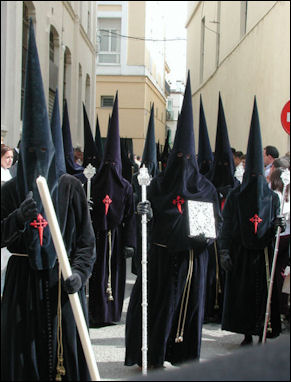
Procession in Seville Easter is held on the First Sunday after the first full moon after the vernal (spring) equinox. It celebrates the resurrection of Christ after his crucifixion, signifying his triumph over death and the promise of eternal life. For both Catholics and Orthodox Christians, Easter is the most important religious holiday of the year. It grew out the Jewish holiday of Passover and the pagan spring festivals.
According to the 7th century English historian Venerable Bede, Easter is named after Easter, a the goddess worshiped by the Anglo-Saxons that may have been honored in festival that took place around the same time as Easter. According to some sources, Christian missionaries from Rome encountered the Saxon holiday while traveling in Germany. In an effort to win converts they incorporated element of Christianity into the festival and brought home elements of the Saxon holiday for their celebration of Christ' resurrection.
James Martin wrote in the Washington Post: “When death and resurrection mix with magical bunnies and chocolate eggs, you get Easter — perhaps the most misunderstood Christian holy day. Yet it is also the most essential; without this holiday, the Christian faith would be meaningless. In the popular mind, Easter was subsumed by Christmas long ago. People don’t spend weeks shopping for Easter gifts, hours writing Easter cards to friends and relatives, or days on end watching “An Easter Story” on TBS. [Source: James Martin, Washington Post, April 18, 2014. Martin is a Jesuit priest and author of “Jesus: A Pilgrimage” |~|]
Holy Week
Holy Week, the week before Easter in Late March or April, is celebrated by Christians with a series of events that usually start slowly on Palm Sunday (the day Christ triumphantly entered Jerusalem), builds up to the solemn and gloomy processions on Good Friday (the day Jesus was crucified) and climaxes with joyous feasting and festivities Saturday at midnight and Easter Sunday (when Christ was resurrected from the grave).
During the week, in some places, passion plays (dramas that depict the suffering of Christ), re-enactment of Christ's Trial and his journey to Cavalry (where Christ was crucified) are performed. Often entire towns participate in elaborate Holy Week ceremonies that include elaborate processions and dramas.
Passion Week originally meant the week before Easter. Now it often refers to the week two weeks before Easter and begins with Passion Sunday, which is one Sunday before Palm Sunday and two Sundays before Easter.
According to the BBC: “Palm Sunday celebrates Jesus's triumphant entry into Jerusalem, so when the crosses used in the Palm Sunday service are converted to ashes, the worshippers are reminded that defeat and crucifixion swiftly followed triumph. But using the ashes to mark the cross on the believer's forehead symbolises that through Christ's death and resurrection, all Christians can be free from sin."
See Separate Article HOLY WEEK SEASON factsanddetails.com
Corpus Christi
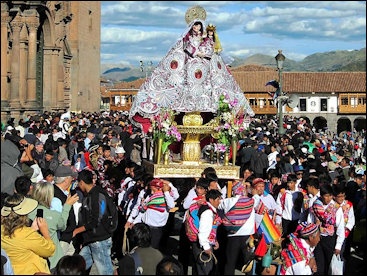
Corpus Christ statue of Santa Ana carried in Cuzco, Peru
According to the BBC: “The festival of Corpus Christi celebrates the Eucharist as the body of Christ. The name 'Corpus Christi' is Latin for 'the body of Christ'. This jubilant festival is celebrated by Roman Catholics and other Christians to proclaim the truth of the transubstantiation of bread and wine into the actual body of Christ during Mass. In some countries in the world, Catholic churches still celebrate the festival, not only with a Mass, but also with a procession that carries the consecrated wafer through the streets as a public statement that the sacrifice of Christ was for the salvation of the whole world. |::|
“Corpus Christi falls between late May and the middle of June, on the first Thursday after Trinity Sunday (60 days after Easter). In some countries the festival is celebrated on the Sunday after Trinity Sunday. In the Church of England this feast is also kept on the Thursday after Trinity Sunday and known as the Day of Thanksgiving for the Institution of Holy Communion (Corpus Christi). |::|
“It's worth noting that Christians already mark the Last Supper, when Christ instituted the Eucharist, on Maundy Thursday (the day before Good Friday). Because Maundy Thursday falls during the solemn period of Holy Week, it was thought necessary to have a separate festival of the Eucharist that would allow the celebration not to be muted by sadness. |::|
See Separate Article: CORPUS CHRISTI DAY europe.factsanddetails.com
Pentecost
Pentecost is the festival when Christians celebrate the gift of the Holy Spirit. The Holy Spirit is the third part of the Trinity of Father, Son, and Holy Spirit that is the way Christians understand God. The symbols of Pentecost are those of the Holy Spirit and include flames, wind, the breath of God and a dove. |::|
Pentecost is held on the seventh Sunday after Easter. It commemorates the descent of the Holy Spirit on the apostles. The Jewish feast of Shavuot, the Feast of Weeks, is sometimes called Pentecost. It is one of the three pilgrimage festivals and begins 50 days after Passover. Pentecostalism is movement within Christianity, that emphasizes grace, expressive worship, evangelism, and spiritual gifts such as speaking in tongues and healing
According to the BBC: “ It is celebrated on the Sunday 50 days after Easter (the name comes from the Greek pentekoste, "fiftieth"). It is also called Whitsun, but does not necessarily coincide with the Whitsun Bank Holiday in the UK. Pentecost is regarded as the birthday of the Christian church, and the start of the church's mission to the world. [Source: June 23, 2009 BBC |::|]
See Separate Article: PENTECOST europe.factsanddetails.com
Image Sources: Wikimedia Commons, except Feast Days for June and October, acatholiclife.blogspot.com/
Text Sources: Internet Sourcebook sourcebooks.fordham.edu ; “World Religions” edited by Geoffrey Parrinder (Facts on File); “ Encyclopedia of the World’s Religions” edited by R.C. Zaehner (Barnes & Noble Books, 1959); King James Version of the Bible, gutenberg.org; New International Version (NIV) of The Bible, biblegateway.com; Christian Classics Ethereal Library (CCEL) ccel.org , Frontline, PBS, Wikipedia, BBC, National Geographic, New York Times, Washington Post, Los Angeles Times, Smithsonian magazine, The New Yorker, Time, Encyclopedia.com, Reuters, Associated Press, Business Insider, AFP, Library of Congress, Lonely Planet Guides, Compton’s Encyclopedia and various books and other publications.
Last updated March 2024

